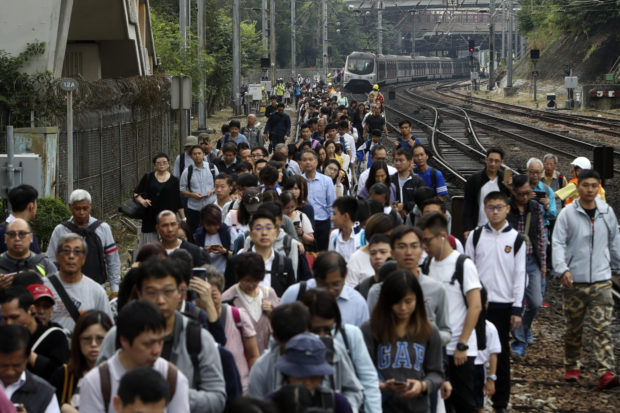Protesters disrupt commute again after violent Hong Kong day
HONG KONG – Protesters disrupted the morning commute in Hong Kong on Tuesday after an especially violent day in the Chinese city that has been wracked by anti-government protests for more than five months.

Commuters walk on the railway after their train service is disrupted by pro-democracy protesters in Hong Kong, Tuesday, Nov. 12, 2019. Protesters disrupted the morning commute in Hong Kong on Tuesday after an especially violent day in the Chinese city that has been wracked by anti-government protests for more than five months. (AP Photo)
Blocking streets and subway stations have been a common tactic of the anti-government protesters, but recent weeks have been marked by clashes with police, escalating vandalism against the government and commercial property, and assaults by both protesters and pro-Beijing supporters.
On Monday, a police officer drew his gun during a struggle with protesters, shooting one in the abdomen. In another neighborhood, a person was set on fire after an apparent argument.
The Hong Kong hospital authority said both were in critical condition. Video of another incident showed a policeman on a motorcycle riding through a group of protesters in an apparent attempt to disperse them.
Police say those events are being investigated but defend the officers’ actions as necessary for their own safety.
Hong Kong’s leader Carrie Lam pledged to “spare no effort” to halt the protests in comments likely to fuel speculation that harsher legal and police measures were planned.
Article continues after this advertisement“I do not want to go into details, but I just want to make it very clear that we will spare no effort in finding ways and means that could end the violence in Hong Kong as soon as possible,” Lam told reporters Monday.
Article continues after this advertisementLam also again refused to accept the protesters’ demands for political concessions. “These rioters’ actions have far exceeded their demands, and they are enemies of the people,” she said.
One of their demands is for the government to stop labeling the demonstrators as rioters, which connotes that even peaceful protest is a criminal activity.
Their other unmet demands are for democratic changes in Hong Kong’s government, criminal charges to be dropped against protesters and for police actions against the protesters to be independently investigated.
Following Lam’s comments, confrontations between protesters and police continued into the night, with black-clad demonstrators torching at least one vehicle and blocking an intersection in the Mongkok district that has been the scene of many clashes.
A taxi driver was taken away by ambulance with head wounds, although it wasn’t immediately clear how he had been injured.
In Washington, the U.S. government said it is watching the situation with “grave concern.”
“?We condemn violence on all sides, extend our sympathies to victims of violence regardless of their political inclinations, and call for all parties — police and protestors — to exercise restraint,” State Department spokeswoman Morgan Ortagus said in a statement.
She urged the government to address the underlying concerns behind the protests and the protesters to respond to efforts at dialogue.
In a widely distributed video of the police-involved shooting Monday morning, an officer shoos away a group of protesters out of an intersection, then drew his gun on a protester who approached him.
As the two struggle, another protester in black approaches. The offer fires at the second protester, who falls to the ground. The officer appeared to fire again, but police said only one protester was hit.
It was the second police shooting of a protester since the demonstrations began, although police have repeatedly drawn firearms to ward off attacks. Police said they arrested more than 260 people on Monday, raising to 3,560 the number of arrests since the movement erupted in June.
Few details were available about the burning incident in the Ma On Shan neighborhood. Video posted online shows the victim arguing with a group of young people before someone douses him with a liquid and strikes a lighter.
Police fired tear gas and deployed a water cannon in parts of the city and charged onto the campus of Chinese University, where students were protesting. Online video also showed a policeman on a motorcycle riding through a group of protesters in an apparent attempt to disperse them.
The protests initially began over a proposed law that would have allowed criminal suspects to be extradited to mainland China, where they could face opaque and politically sensitive trials. Activists saw the bill as another sign of an erosion in Hong Kong’s autonomy and civic freedoms, which China promised would be maintained for 50 years under a “one nation, two systems” principle when the former British colony returned to Chinese control in 1997.
Lam eventually withdrew the extradition bill but has insisted the violence stop before a further political dialogue can take place.
District council elections on Nov. 24 are seen as a measure of public sentiment toward Hong Kong’s government. Pro-democracy lawmakers have accused the government of trying to provoke violence to justify canceling or postponing the vote. /gsg